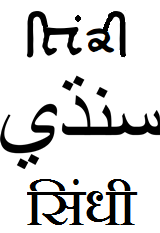Difference between revisions of "Language/Sindhi/Grammar/Pronouns"
m (Quick edit) |
m (Quick edit) |
||
| Line 102: | Line 102: | ||
===Use of Personal Pronouns in English | English in Sindhi - YouTube=== | ===Use of Personal Pronouns in English | English in Sindhi - YouTube=== | ||
<youtube>https://www.youtube.com/watch?v=VK0CGTFkr98</youtube> | <youtube>https://www.youtube.com/watch?v=VK0CGTFkr98</youtube> | ||
==Related Lessons== | |||
* [[Language/Sindhi/Grammar/Plurals|Plurals]] | |||
* [[Language/Sindhi/Grammar/Questions|Questions]] | |||
* [[Language/Sindhi/Grammar/Future-Tense|Future Tense]] | |||
* [[Language/Sindhi/Grammar/Conditional-Mood|Conditional Mood]] | |||
* [[Language/Sindhi/Grammar/Adjectives|Adjectives]] | |||
* [[Language/Sindhi/Grammar/Negation|Negation]] | |||
{{Sindhi-Page-Bottom}} | {{Sindhi-Page-Bottom}} | ||
Revision as of 23:03, 25 February 2023
Hi Sindhi learners! 😊
In today's lesson, we will be discussing pronouns in the Sindhi language. Pronouns are words that replace nouns and can be used to refer to people, places, things, or ideas. They are an important part of any language and understanding how to use them correctly is essential for speaking and writing in Sindhi.
Personal Pronouns
Personal pronouns are used to refer to people or things. In Sindhi, there are two types of personal pronouns: subject pronouns and object pronouns.
Subject Pronouns
Subject pronouns are used when the pronoun is the subject of the sentence. For example, "I am going to the store." Here, "I" is the subject pronoun.
In Sindhi, the subject pronouns are:
- Mein (I)
- Tu (You)
- Aahe (He/She/It)
- Hum (We)
- Tum (You)
- Aahe (They)
For example:
- Mein jaarra han. (I am going.)
- Tu kitaab parhda han. (You are reading a book.)
- Aahe bohat khush han. (He/She/It is very happy.)
- Hum jaarra han. (We are going.)
- Tum jaarra han. (You are going.)
- Aahe jaarra han. (They are going.)
Object Pronouns
Object pronouns are used when the pronoun is the object of the sentence. For example, "She gave me a book." Here, "me" is the object pronoun.
In Sindhi, the object pronouns are:
- Mujhe (Me)
- Tujhe (You)
- Ussay (Him/Her/It)
- Humko (Us)
- Tumko (You)
- Unsay (Them)
For example:
- Ussay mujhe kitaab diya. (She gave me a book.)
- Tujhe kitaab diya. (He gave you a book.)
- Humko kitaab diya. (They gave us a book.)
- Tumko kitaab diya. (They gave you a book.)
- Unsay humko kitaab diya. (They gave us a book.)
Possessive Pronouns
Possessive pronouns are used to show ownership or possession. In Sindhi, the possessive pronouns are:
- Mera (My)
- Tera (Your)
- Uska (His/Her/Its)
- Hamara (Our)
- Tumhara (Your)
- Unka (Their)
For example:
- Mera ghar hai. (This is my house.)
- Tera ghar hai. (This is your house.)
- Uska ghar hai. (This is his/her/its house.)
- Hamara ghar hai. (This is our house.)
- Tumhara ghar hai. (This is your house.)
- Unka ghar hai. (This is their house.)
Demonstrative Pronouns
Demonstrative pronouns are used to point out specific people, places, things, or ideas. In Sindhi, the demonstrative pronouns are:
- Yeh (This)
- Woh (That)
- Yeh (These)
- Woh (Those)
For example:
- Yeh kitaab hai. (This is a book.)
- Woh kitaab hai. (That is a book.)
- Yeh kitaaben hain. (These are books.)
- Woh kitaaben hain. (Those are books.)
If you have any questions, please ask them in the comments section below.
Feel free to edit this wiki page if you think it can be improved. 😎
Videos
Pronoun | Sindhi Grammar | Kinds of Pronoun - YouTube
Sindhi Grammar Pronoun lesson 3 ضمير || Sindhi Alphabet|| Sindhi ...
Use of Personal Pronouns in English | English in Sindhi - YouTube
Related Lessons
